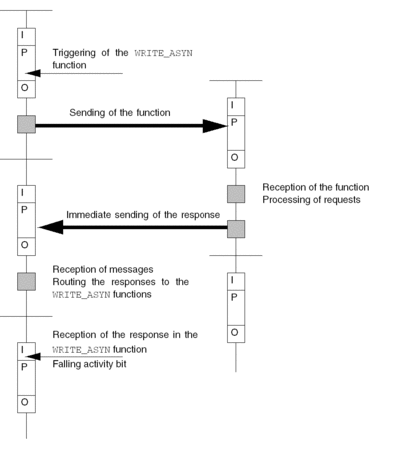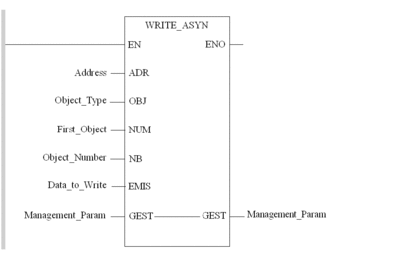Function Description
The WRITE_ASYN function is used to write 1 Kbyte
of data via the asynchronous messaging channel of TSX ETY modules
in TCP/IP mode.
The following data can be write-accessed:
internal bits,
internal words.
Asynchronous writing can only take place between two stations on the same Ethernet TCP/IP network segment.
The WRITE_ASYN function is sent at the end of the MAST task only if this is configured
in periodic mode. It is possible to activate 8 functions simultaneously.
The size of the send and receive buffers is expressed in words. It is 512 words, or 1024 bytes.
WRITE_ASYN function uses the UNI-TE V2.0 protocol.The additional parameters EN and ENO can be configured.
Exchange principle
The following diagram illustrates the exchanges between two
stations for a WRITE_ASYN function:

FBD representation
Representation:

LD representation
Representation:

IL representation
Representation:
LD AddressWRITE_ASYN Object_Type, First_Object, Object_Number, Data_to_Write, Management_ParamST representation
Representation:
WRITE_ASYN(Address, Object_Type, First_Object, Object_Number, Data_to_Write, Management_Param);Parameter Description
The following table describes the input parameters:
Parameter |
Type |
Comment |
|---|---|---|
|
ARRAY [0.. 5] OF |
Address of the destination entity
of the exchange. Addresses are of the type: |
|
|
Type of objects to write:
|
|
|
Index of the first object to be written in the destination device. |
|
|
Number of objects to write. |
|
ARRAY [n... m] OF |
Word table containing the value of the objects to be written. |
The following table describes the input/output parameters:
Parameter |
Type |
Comment |
|---|---|---|
|
ARRAY [0.. 3] OF INT |
Exchange management table. The operation report takes one of the following values:
Note: do not forget to program a Timeout value to stop an exchange in progress when the response is not returned to the sender. |


